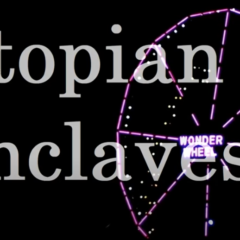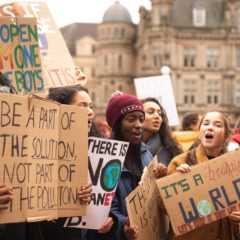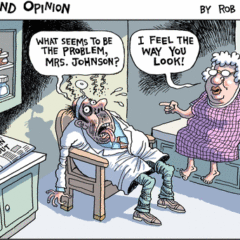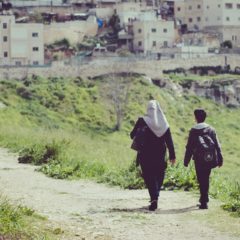Utopian Enclaves in Feminist Cyberpunk
One of our talented PhD researchers, Sasha Myerson, has recently produced this video essay on "Utopian Encalves: The City in Feminist Cyberpunk." The video essay replaces Sasha's conference paper presentation at the Cyberpunk Culture conference, taking place online on 9-10 July 2020. Abstract: Cyberpunk is conventionally considered a dystopian genre. But, as Tom Moylan has argued, there is a sharp difference between dystopias of resignation—which capitulate to the logics of neoliberalism—and critical dystopias, which “adopt a militant stance that is informed and empowered by a utopian horizon that appears in the text”. Such texts seek to overcome dystopia, find a way beyond it, and transform the present moment towards utopia. Furthermore, cyberpunk is a genre deeply rooted in urban experience, recalling both the dense neon-soaked streets of William Gibson’s Neuromancer (1984), or Ridley Scott’s Blade Runner (1982), and the hyperreal, fragmented urban spectacle that appears in the works of Jean Baudrillard and Frederic Jameson. Yet, such spectacle is not necessarily synonymous with dystopia. As feminist geographer Elizabeth Wilson writes, “the excitement of city life cannot be preserved if all conflict is eliminated […] life in the great city offers the potential for greater freedom and diversity than life in small communities. This is particularly important for women.” Wilson’s vision of the city calls for a radical embrace of “the freedom and autonomy they offer”, while making such freedom “available to all classes and groups.” This paper will read Emma Bull’s Bone Dance (1991) and Naolo Hopkinson’s Brown Girl in the Ring (1998), both texts that work within the genre of cyberpunk, through the critical lens of Moylan and Wilson. Both authors recognise the contradictions of the city, a space often built upon exclusion and inequality that can simultaneously incubate surprising political alliances and glimpses of utopia. My analysis will focus specifically on two passages, the opening of Hopkinson’s text and the ending of Bull’s, which take the conventions of the cyberpunk city and locate within it the potential for a non-hierarchical, diverse and utopian vision of the city that “shimmers just beyond” their pages Bio: Sasha is a PhD student at Birkbeck College. Her research focuses on urban space and the built environment in 1990s feminist Cyberpunk science-fiction. Examining posthuman and multiple subjectivities, her work explores how such individuals navigate, survive and resist within technologized cities of surveillance and discipline. Sasha is a co-director of the London Science-Fiction Research Community and helps to organise Beyond Gender, a feminist research collective. For more information see here: http://cyberpunkculture.com/cyberpunk-culture-conference/program-friday/%C2%A726-sasha-myerson/...
Crisis and Contemporary Literature
CCL Director Dr Caroline Edwards recently spoke on the opening roundtable at the Virtual Conference for the British Association for Contemporary Literary Studies (BACLS), which was held on Friday 26 June 2020. The theme of the roundtable was "Crisis: Contemporary Conversations" and Caroline spoke alongside: Sheena Kalayil, author of The Bureau of Second Chances (2017), which won the Writers’ Guild Award for Best First Novel, The Inheritance (2018) and The Wild Wind (2019); Ben Doyle, Publisher for Literary Studies at Bloomsbury Academic; and Dr Zayneb Allak, a writer and Lecturer in Creative Writing at Edge Hill University. Caroline's talk explored the relationship between utopianism as a praxis that responds to historical crises and science fiction, focussing particularly on ecocatastrophe narratives (the subject of her next book provisionally titled Arcadian Revenge: Science Fiction in the Era of Ecocatastrophe). You can watch her talk below or here on Caroline's YouTube channel. For more information about the British Association for Contemporary Literary Studies (BACLS), visit the website: https://www.bacls.org/ Photo by Callum...
Exploring Physician Burnout
Birkbeck CCL member and Director of the Birkbeck Centre for Medical Humanities, Prof. Jo Winning, has just published a new article in the BMJ Medical Humanities journal on "The use of an object: exploring physician burnout through object relations theory." The article (see below) examines the crisis of physician burnout, which has been widely and repeatedly reported across the mainstream press and medical journals around the world in the closing years of the second decade of the 21st century. Despite multiple systematic reviews and commentary on the scale of this ‘global epidemic’, understandings of both the phenomenon and the most effective interventions remain limited. Practice-based medical humanities represents the collaborative sharing of conceptual tools for understanding illness and clinical practice and the shouldering of responsibility for mapping the shape of care, in all its local, national and global contexts, thinking-with rather than critique on the profession and its practices. In keeping with this approach, this article offers a new perspective on the contemporary crisis of physician burnout by exploring the objectification of the clinician’s body within the systems and practice of healthcare. Within the context of medical humanities’ scholarship, discussions of objectification usually navigate towards a discussion about patient identity and its potentially reductive objectification within the frameworks of biomedical science. However, this article crosses the cultural divide between clinician and patient, and comes to focus on the objectification of the clinician herself, using object relations theory from the field of psychoanalysis to excavate the psychodynamics of care and their impact on clinicians, and the systems of healthcare in which care is delivered. Jo's article develops the feminist epistemological concept of 'thinking-with', alongside Donna Haraway's concept of tentacular thinking, which she has also written about in a recent article published in the journal Feminist Encounters (see here for info on this). (If you can't see the article embedded below just hit refresh). Featured image by Rob Rogers, reproduced in Jo's article with permission and shared here under a CC BY-NC...
Asylum Monologues
by Dr Agnes Woolley, Lecturer in Transnational Literature and Migration Cultures One of the Arts Weeks at the School of Arts this year coincided with Refugee Week (15th-21st June) and this performance from Ice and Fire’s Actors for Human Rights kicked off their virtual tour of the UK. With a pared down performance style based on the verbatim testimony of asylum seekers, Asylum Monologues is well-suited to on screen delivery and listening to the testimony of asylum seekers working their way through the UK system is a stark and timely reminder of the iniquities embedded in so many of our institutional and procedural structures. Much of my work has been concerned with issues of representation and voice in the context of refugee narratives. What forms and in what fora do we encounter refugee stories? What are the ethics of representation in this context? And how have refugees found ways to give voice to their experiences outside the legal infrastructure of the asylum adjudication process? The idea of voice and voicing experience has been – since the middle of last century – the preeminent way in which human rights are analysed and asserted. And I would say that testimony has become the prevailing narrative mode for refugee experience. But the testimonial forms we find in documentary, film and performances like Asylum Monologues are also intricately linked to the legal process to which asylum seekers are subject, where they must testify to a narrative of persecution. The United Nations Convention Relating to the Status of Refugees, first ratified in 1951, continues to be the basis for asylum claims in most refugee-receiving countries (although the African Union has a different and more expansive definition for the continent that has a much larger proportion of the world’s refugee than Europe). The Convention defines a refugee as one who has a ‘well-founded fear of persecution’. Enacted at the level of the signatory nation state, the procedural characteristics of the asylum decision-making process thus demand a particular narrative of persecution for the conferment of refugee status and inclusion in the civic body. For this reason, perhaps more than any other aspect of human rights legislation, the Convention Relating to the Status of Refugees depends almost entirely on the story of the claimant. But claimants have very little agency over this story in the legal realm because the process operates on a particularly restrictive set of narrative conditions. On the whole asylum seekers must answer questions, rather than be allowed to tell their story in their own way. Translators can often be a barrier to expression if, for example, they speak a different dialect or if the translator...
Theses on Viral Time
Featured image by Andy Holmes on Unsplash The following has been collectively written by a number of academic contributors based at Birkbeck and beyond who, for the purposes of this experimental piece, are calling themselves "Le Comité de Salut Public." I Viral time is a sudden telescoping of the non-human time of virus life with the lived, clock time of human beings. It leads to a sense of the floor falling out: of the inbreaking of the alien into the everyday and the disruption of human history by non-human time. Human history is characterised by a sense of repetition. We tend to imagine it as a horizontal line, divisible, calculable and stable. But its stability hinges on the idea of an impartial observer grounded at safe distance. Everything is then projected on to his sovereign eye as to the vanishing point of infinity, and in this manner the whole of timespace comes to be arranged for this one-eyed spectator as the universe was once thought to be arranged for God. As visuality and spectacle. This is why God and its kingly representatives on Earth could be easily replaced by a money-god fixated on slicing and dicing the body, dividing clock time and the expository value of humans. But alien time reveals human history to be only his-story. It says: “You haven’t heard mine yet!”. The alien is a time of an altogether different scale. The scale of disease becoming the anxiety of disrupted routines. And the latency of the interrupted projects of the past coexisting in the vortex of time, abstract and unfinished. Given its virulence, its spread and its inhumanity, an analysis of the virus can proceed along lines parallel to the critique of capitalism. Thus, the abstract time of the virus, the hegemony of ill-health, suggests that behind all value is not so much labour time, as health-time. The abstract time of the virus, as an inhuman time of universal illness, both reduces individual concrete time to a period of anticipation of ill-health or death, and elevates matters of life and death to the time scale in which they matter most once again: the entrance into the vegetable time of putrefaction and decay, or memory time- provided that there are still some around to remember us. These others need not be friendly. By bringing decay, putrefaction and memory they provide entry into other dimensions of relation and different orders of the visual. They’re a time-machine, in and of time and at the same time producers of time. Vegetable time and memory-time circulate through aliens, critters and enemies in the precise sense that memory has nothing to do with...
An Introduction to Marx’s Critique
CCL member Dr Sean O'Brien is running a four-part lecture series for the 87 Press on the Marxian critique of political economy, exploring what it can tell us about the twenty-first century—an historical moment marked by deindustrialization, economic stagnation, growing labour superfluity, and a political landscape in which the figure of the worker no longer occupies the central space it once did. As Sean writes in the introduction to the lecture series, we’re quite far from the world in which Marx lived and wrote, a world defined by the development of large-scale industry, a growing industrial working class concentrated in factories, and the rising power of the workers’ movement. Since then, much has changed economically and politically, a fact made most visible perhaps in the collapse of actually existing socialism. But if the American political scientist Francis Fukuyama declared in the 1990s the ‘end of history’ and the triumph of Western liberal democracy—exemplified for Fukuyama in the end of the cold war and the globalization of the free market—recent decades have witnessed not only a series of devastating economic crises, but also a surge of popular interest in Marx and a renewed scholarly interest in the work of Marxist theory. And this return to Marx gives Humanities students and scholars a chance to read Marx’s work with fresh eyes. The series will open with an overview of Marx’s method and the some of the core categories of his critique before turning to consider theories of real abstraction, questions of geopolitical economy and the history of the capitalist class relation. We’ll explore the relationship between cycles of accumulation and cycles of struggle, concepts such as impersonal compulsion and form-determination, and the difference between what has been called traditional or orthodox Marxism and a more esoteric reading of Marx that, in the Anglo-American sphere, has come to be known as value-form theory. Below is the first lecture in the series: The idea behind the series is basically to offer a public-facing, para-academic introduction to Marx for Humanities students and scholars working in one facet or another of contemporary studies who might be familiar with Marxist literary or aesthetic theory but haven’t yet had a chance to actually engage much with Marx himself and the critique of political economy in particular. And so, over the course of the lectures, we’ll tackle some pressing questions for people who work and study in the Humanities and who are interested in a Marxism for the twenty-first century. For instance, what does the end of growth mean for the future of work? How should we think about the relationship between production and circulation, or the regularity...









Recent Comments